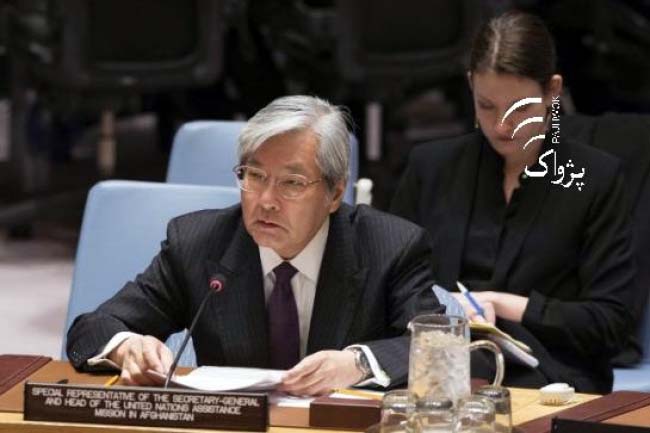KABUL - There could be no military solution in Afghanistan as a prolonged conflict would only lead to worsen misery for the people and undermine the foundation for economic growth, says the UN.
Neighbors were more willing to work toward bringing peace to Afghanistan, acknowledging the importance of establishing an environment conducive to regional stability, Secretary-General’s Special Representative for Afghanistan Tadamichi Yamamoto told the United Nations Security Council.
He stressed the need for strong international backing, both political and financial, for Afghan government efforts to tackle the challenges. “I am deeply troubled by the heightened tension between Afghanistan and Pakistan, and call for the reduction of tension through dialogue.”
He said the future of Afghanistan had to be built through an Afghan-owned and Afghan-led process for all Afghans. The path of peace must be pursued through negotiations, and not through violence, he continued.
The envoy asked the Taliban to enter peace talks without preconditions, urging all actors to exercise their influence to this end. The government, neighbouring countries and other key powers should reinforce the message that the Taliban could be a part of Afghanistan’s future and its political and social fabric.
An endless conflict and violence was simply unacceptable, he observed, saying UNAMA stood ready to move the process forward and to help generate momentum for peace.
Pursuing an inclusive peace process and economic growth against the backdrop of an intensifying insurgency is a major challenge to the Afghan government, says the top UN diplomat in the country.
“Fortunately, the ground is being prepared to make Afghanistan a success. Internationally, Warsaw and Brussels set the stage for steady progress,” the UNAMA head told the powerful UN body.
On the domestic front, he said, the government had introduced programmes to improve social services and promote growth and development. He called for delivering concrete outcomes to improve Afghan lives.
He highlighted three areas where the Ashraf Ghani administration -- halfway through its constitutional term -- had initiated visible steps forward: Anti-corruption, the electoral process and women’s economic empowerment.
A range of institutional reforms, such as efforts to restore integrity to the management of public services, had been introduced, he noted. “We need, however, to acknowledge that much remains to be done, including addressing corruption in security institutions.”
Yamamoto believed political leadership and strong determination was needed to deal with the problem. UNAMA will launch its first anti-corruption report, titled “Afghanistan’s Other Battlefield: The Fight against Corruption”.
He referred to the government’s commitment to holding fair, inclusive and transparent parliamentary elections. The commissioners of the Independent Election Commission and the Electoral Complaints Commission have already been appointed.
Rebuilding trust in the electoral process would be a challenging task, said the diplomat, who hoped all stakeholders would invest in an inclusive process and build the broad political support necessary for improved polls.
The UNAMA head also mentioned the launch of the Women’s Economic Empowerment National Priority Programme -- a plan that recogniswes women as key economic actors whose contribution to Afghanistan’s future is essential.
“For many women, the story is one of discrimination, poverty, and oppression. For the story to change, women must be allowed full participation and leadership, and must be respected as decision-makers at all levels…”
He said there had been some downward trends in key indicators, such as access to health clinics and education facilities, due to intensifying insecurity over the past two years.
Nine million people, or close to a third of the Afghan population, were below the poverty line, and given the population growth, per capita GDP was likely to fall, he explained.
“We need to act now to reverse this course. The commitments made in Brussels, as well as the Afghan National Peace and Development Framework and the Citizen’s Charter provide an essential opportunity for progress in this regard…”
He stressed the government’s efforts would require continuing support of international partners. More focused action on governance, social services and private sector development to promote equitable growth will be necessary.
The deteriorating security situation remained of grave concern, he remarked, saying everything should be done to improve security. He also urged vigilance about the presence of foreign fighters, including Daesh. (Pajhwok)
Home » Afghanistan » No Military Solution in Afghanistan: UN Envoy
No Military Solution in Afghanistan: UN Envoy

